ERIAS Final partnership meeting
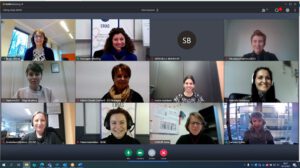
On 16/12/2021 the partners of the ERIAS project met for their final partners meeting and discussed the outcomes of the project as well as the project’s potential for continuation.
211216 ECH Press Release – ERIAS final
ERIAS in a nutshell
Vademecum of positive integration practices
On the occasion of the final ERIAS project conference, organised in Greece by the Greek project partners, the vademecum of positive integration practices was officially released.
The vademecum comprises 38 compelling testimonials from third country nationals and European employers who speak about their personal labour market integration paths.
Talent Partnerships with third countries – first encounter with Commissioner Johansson


In a virtual meeting between Commissioner Ylva Johansson and European economic and social partners, organised in the frame of the European Partnership for Integration, EUROCHAMBRES welcomed the Talent Partnerships Initiative the European Commission is to launch under the new pact on migration and asylum.
Even though the current focus is on recovering from the pandemic and its economic and employment consequences, we should not loose the overall demographic situation of the EU out of sight and think about the medium and long term. Europe’s economy will need talents from third countries to counter the effects of an ageing population.
EUROCHAMBRES stressed that the Talent Partnership Initiative should be based on the skills needs of European businesses, its approach should be flexible and multi-stakeholder oriented. The experience that the ERIAS partners have gathered with integrating migrants in the labour market, going from the initial skills assessment over training to finding placements with companies, can certainly be of added value in the development of the talent partnership methodology.
Action Plan on Integration and Inclusion released by the European Commission
The European Commission has published its Action Plan on Integration and Inclusion 2021-2027 calling for the development of an inclusive and cohesive society involving all relevant stakeholders. It builds on the achievements of the previous action plan and reckons that the priorities of the previous action plan remain valid for the upcoming period.
The new Action Plan foresees actions in four main sectoral areas: education and training, employment and skills, health and housing.
With their activities in the frame of ERIAS, the project partners very much contribute to the objectives of the Action Plan, promoting Third Country Nationals (TCN) labour market access in four European countries, thanks to the different activities they have put in place, ranging from the initial skills assessment of TCN, over dedicated training sessions, to identifying employment opportunities for them.
The Commission’s action plan is available here.
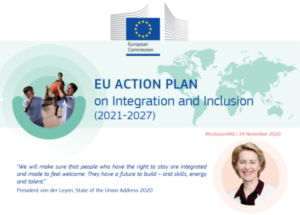
Migrants’ labour market integration in social enterprises: the ERIAS Integration Check List
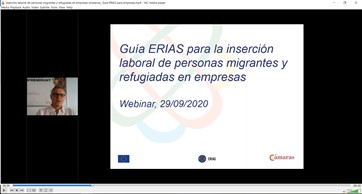
Valencia Chamber presented today the Spanish version of the Integration Check List to an audience of entreprises and organisations from the social economy sector and in the virtual presence of representatives of the Spanish ministry of inclusion, social security and migration, the Valencia office of CEAR (Spanish Commission for refugees assistance) and Treball Solidari, an NGO active in Mallorca for the integration of migrants.
The presentation of the Integration Check List was linked to a debate on the current situation in Spain relating to migrants’ labour market insertion, possible improvements in the field and awareness raising measures for companies to stimulate the employment of third country nationals.
New Pact on Asylum and Migration released by the European Commission
The European Commission published its new Pact on Asylum and Migration, which is to offer solutions to the different challenges and hurdles that the European Union has had to face since the so-called migration crisis in 2015. Key elements of the new pact include building stronger trust, fostered by better and more effective procedures; well-managed Shengen and external borders; effective solidarity; skills and talent; acting together to deepen international partnerships; and flexibility and resilience.
Extensive information concerning the new pact can be found on the official EC webpage.
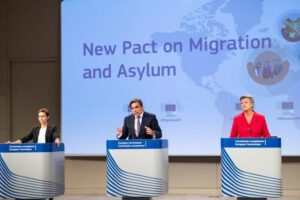
Renewal of the European Partnership on Integration
Today, EUROCHAMBRES, as signatory of the European Partnership on Integration, took part in a ceremony hosted by the European Commission, in the presence of Ylva Johansson, Commissioner for Home Affairs and Nicolas Schmit, Commissioner for Jobs and Social Rights.
During the ceremony, the European Commission and the European Economic and Social Partners renewed their cooperation to enhance the integration of migrants and refugees into the labour market.
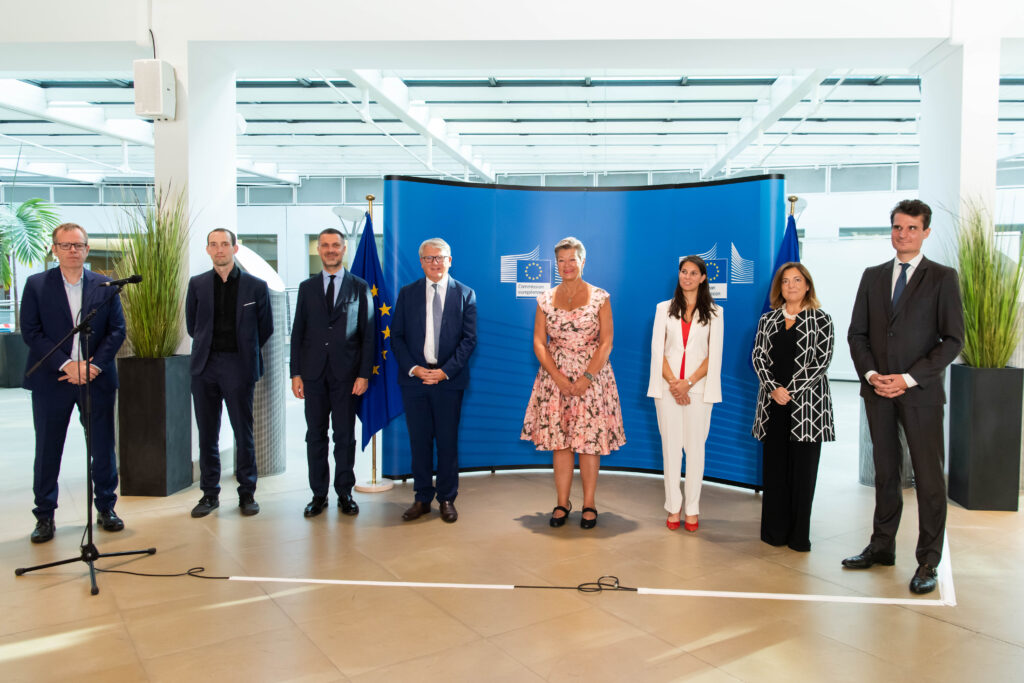
In a joint statement on the renewal of their cooperation under the European Partnership on Integration launched in 2017, they highlighted areas for future focus, and reaffirmed the importance of a multi-stakeholder approach for early integration into the labour market benefitting both refugees and the economy and society at large.
EUROCHAMBRES CEO, Ben Butters, highlighted that, even though the situation changed this year with a decreasing economic activity, the struggle of businesses for the right talents and skills is not finished yet. “The Partnership could be a useful instrument in helping to bridge the skills gap by supporting initiatives like ERIAS, which seeks to train refugees for them to find a job in line with labour market needs or to become entrepreneurs”.
Project partners agree to adjust ERIAS activities in context of ‘Corona Crisis’
The ERIAS partners met online on 27 May 2020, in order to take stock of the project’s implementation, assess the impact of the COVID-19 pandemic and adjust forthcoming activities, taking into account the overall project objectives and time frame.
On this occasion, EUROCHAMBRES’ Deputy CEO, Mr Ben Butters, stated: “Migrants are an important element of the employment equation, even in challenging times like now, when overall unemployment is set to increase further due to the COVID-generated economic crisis. The ERIAS project brings a valuable contribution by equipping migrants with the right skills for finding a job or becoming entrepreneurs.”
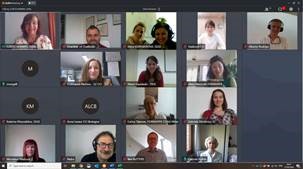
Discussion with EU Commissioner focuses on the role of third country nationals in responding to COVID-19 pandemic and contributing to post-crisis economic recovery
On 5 May 2020, the EU Commissioner for Home Affairs, Ylva Johansson, held an online discussion with representatives of business, employers, trade unions & NGOs working with migrants from non-EU countries. This discussion focused on the essential role that third country nationals are playing in the context of the response to the COVID-19 pandemic throughout the EU Member States, and also on the role that migrants from outside the EU can play in terms of contributing to the recovery as Europe’s economy starts to open-up again.
In a statement released following the online discussion, Commissioner Johansson noted that: “Migrants are a crucial component of the EU social and economic workforce. The recent COVID-19 pandemic has revealed the reliance on formal and even informal working practices.”
“Many of those making it possible for all of us to get through the crisis are immigrants,” continued the Commissioner. “Health and care assistants, supermarket staff, agricultural workers and many more were born outside the EU. These essential workers will also be part of the recovery phase. Post-crisis, their contribution to the rebuilding of our economy will also strengthen the cohesion of our communities.”
According to a briefing paper prepared by Francesco Fasani and Jacopo Mazza, which was published by the European Commission last month, migrant workers from outside the EU make up a significant part of the workforce in certain key occupations such as cleaning, construction, food processing and personal care. In many* of the EU Member States, more than 10% of people working in “key occupations” are migrant workers from non-EU countries.
One of the business representatives taking part in the online discussion was the CEO of EUROCHAMBRES, Mr Arnaldo Abruzzini, who reminded the other participants that migrants play a vital role in the European economy – both as employees and as entrepreneurs, and therefore supporting the economic participation of migrants is “an economic necessity for our businesses in various sectors“.
Mr Abruzzini said that Chambers are in favour of an EU-wide plan that would make it easier for migrant entrepreneurs to start new businesses. “They will contribute to the recovery and to employment” – he insisted.
The ERIAS Project contributes to both: preparing third country nationals for employment and also for becoming entrepreneurs. In view of the current situation, in the context of the global COVID-19 pandemic, certain project activities have slowed down. However, it is expected that these activities will speed up again as soon as the situation returns to normal, and the project partners remain determined to ensure a successful implementation of the various ERIAS activities.
* The EU Member States where migrant workers from non-EU countries represent more than 10% of people working in “key occupations” include Austria, Belgium, Cyprus, Germany, Estonia, Spain, Italy, Luxembourg and Sweden.
Immigrant Key Workers: Their Contribution to Europe’s COVID-19 Response
(Briefing published by the European Commission on 24 April 2020)
Read the statement issued by Commissioner Johansson on 6 May 2020
First training seminar in Valencia completed
The first ERIAS training seminar organised by Valencia Chamber has been successfully completed. A group of 20 migrants/refugees were taught in 6 sessions what documents they needed for getting a job and how to handle food (leading to a food handling certificate). The training also comprised the visit to a local company.
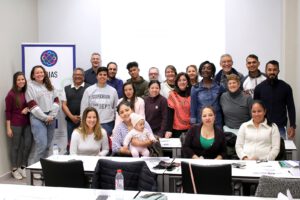
Employers in Stara Zagora discuss how to employ migrants from third countries

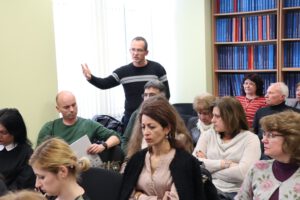
During the workshop, organised by Stara Zagora Chamber of Commerce and Industry, participants raised many questions and engaged in a lively discussion about their experience and difficulties with hiring third country nationals, including refugees. According to them, the recruitment of workers from third countries is a niche in the Bulgarian labour market that has not yet been developed.
The main call from the participants was for a strong cooperation to be built between the respective institutions and businesses, and for more projects and initiatives like ERIAS to be implemented in Bulgaria in order to motivate employers to hire third country nationals.
BCCI organises information seminars for employers in Sofia and Haskovo
In the framework of the ERIAS project, the Bulgarian Chamber of Commerce and Industry (BCCI) and Haskovo CCI organised seminars for employers in the cities of Sofia and Haskovo. The participants of these events, which both took place on 11 December 2019, were given useful information on the legal framework and practical aspects of employing workers from countries outside the EU.
Legal advisors presented the regime for the employment of so-called “third-country nationals”, including the main types of work permits, the necessary documentation and the duration of employment contracts. The also explained the rules regarding the need to conduct a market test in order to assess whether there is a suitable Bulgarian citizen or resident who could fill the vacancy, before proceeding with hiring a worker from outside the EU.
PHOTOS: Seminars for employers in Sofia (left) and Haskovo (right) on 11 December 2019 (© BCCI/Haskovo CCI)

Participants in these seminars included representatives of companies and other interested parties. The seminar in Sofia was attended by 25 representatives of companies and 15 representatives of business associations, plus colleagues from BCCI. The seminar in Haskovo was attended by 40 company representatives and 12 representatives of various organisations.
The ERIAS project was presented during the seminars by Gabriela Dimitrova from BCCI (in Sofia) and Katya Atanasova from Haskovo CCI (in Haskovo). Addressing the seminar in Haskovo, Yancho Yanev, Chairman of the Board of Haskovo CCI, stressed that the activities of the ERIAS project in Bulgaria will support employers to recruit employees from third countries.
For more information, please contact interdpt@bcci.bg
BCCI presents the ERIAS project to partner institutions and organizations
The Bulgarian Chamber of Commerce and Industry (BCCI) presented the ERIAS project to partner institutions and organizations engaged in the integration of migrants in Sofia on 26 September 2019. Among the participants in the 15th regular integration meeting coordinated by the High Commissioner for Refugees were representatives of: the Ministry of Labor, the Ministry of Education, the Employment Agency, the Bulgarian Refugee Council, the Ombudsman, Caritas Bulgaria and others.
Gabriela Dimitrova, Director of International Cooperation and International Organizations at BCCI, presented the ERIAS project. She explained that ERIAS, which began in early 2019, is driven by the desire of chambers of commerce and industry in Europe to jointly implement modern integration methods that will lead to more employment among migrants from third countries, including refugees.
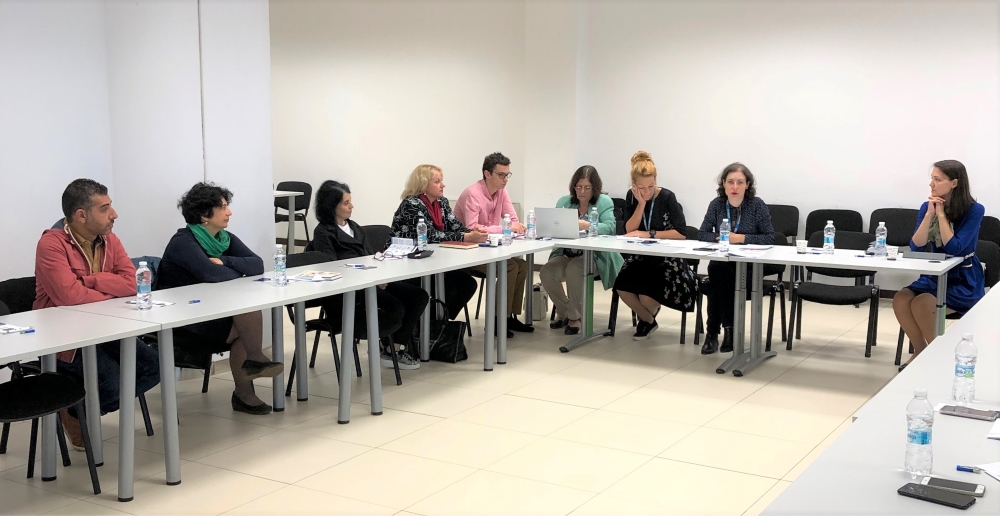
In the framework of the ERIAS project, BCCI, together with Haskovo CCI and Stara Zagora CCI, is organizing Employers’ Workshops in different cities of Bulgaria where there are significant numbers of refugees. These Workshops are taking place in Sofia (on 11 December 2019), Haskovo (on 12 December 2019) and Stara Zagora (on 28 January 2020). The programme of each Workshop includes an introduction to the ERIAS project, as well as specific information on apprenticeship programmes for migrants, the social integration of migrants as well as the legal framework for employing migrants from countries outside the EU/EEA.
For more information, please contact interdpt@bcci.bg
Training programme for refugees and protected persons in Milan (Italy)
The ERIAS project has two partners in Italy – both of them based in Milan. FORMAPER is a special company founded by the Chamber of Commerce of Milan, Monza-Brianza and Lodi, which aims to contribute to the spread of business culture and the development of entrepreneurship in these 3 provinces. FISASCAT CISL of Milan is a trade union federation that represents workers in the trade, tourism and services sectors.
As part of their contribution to the ERIAS project, FORMAPER and FISASCAT CISL are working together to provide training for refugees and beneficiaries of humanitarian protection schemes (not including asylum seekers). The first training programme started on 18 November and will continue until 20 December 2019.
The training programme includes 32 hours of advanced Italian language classes, as well as classes in: Preparing your CV, Safety in the workplace, Hazard Analysis and Critical Control Points, Rights and duties of workers and employers. The participants will also learn important information about working in the catering, mechanics and electronics sectors, as well as entrepreneurship, finance and micro-economics.
After completing the training programme, starting in January 2020 the trainees will be given opportunities to gain practical work experience by undertaking 6-month internships in local companies. During this time, they will also benefit from regular individual coaching sessions.
For more information, please contact Andrea Badalamenti
ERIAS kicks off in Valencia
On 19 June 2019 Valencia Chamber of Commerce and Industry organised its ERIAS information event about sustainable labour market integration of refugees and migrants. Besides the presentation of the project, the current migration situation in Spain was addressed and CEAR’s activities were presented (Comisión española de ayuda al refugiado – Spanish commission for refugees assistance). Real integration cases were presented and possible improvements of migrants labour market integration paths were discussed.
Press clippings Almeria (ES) workshop
The first ERIAS workshop in Spain (Almeria) met with interest in the local press, as shown by the different press clippings.
Press release
Project for integration of migrants in the European labour market launched in Milan
